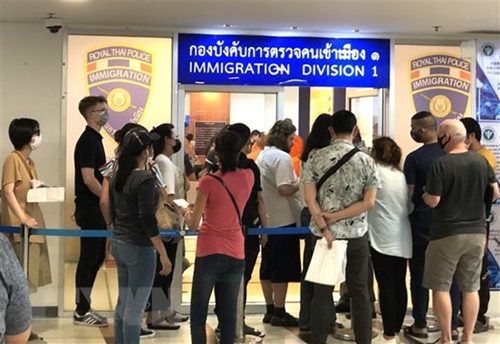They should check frequent updates on the local situation as well as recommendations by Vietnamese representative missions in their host countries, said Vice Chairman of the State Committee for Overseas Vietnamese Affairs Luong Thanh Nghi.
Besides, they must also cooperate with local authorities and rigorously comply with local regulations and emergency measures to curb the spread of the SARS-CoV-2 that causes the disease, Nghi said, adding that Vietnamese representative missions abroad are ready to support them.
    |
 |
|
Many foreigners queue up outside Thai Immigration Division 1 in Bangkok to apply for an extension of their entry visa on March 23. |
Data shows that about 5.3 million Vietnamese people are residing, working and studying in 130 countries and territories around the globe. They include over 300,000 students at all levels of education and around 600,000 guest workers, mostly in Asia and the Middle East.
Only a handful of Vietnamese people overseas have reportedly been infected with the virus while foreign countries are enforcing various measures to protect their citizens and foreigners, including the provision of free diagnostic testing and treatment for infected people, he noted.
Vietnamese expats have been providing great support for one another during this time, the official continued. Many Vietnamese communities living in the Europe, America and Oceania have contributed to COVID-19 relief efforts by making anti-bacterial masks and donating medical supplies and food to local governments, hospitals and residents.
Vietnamese people in Poland, the Czech Republic, Russia and other countries have donated 100,000 face masks as well as hand sanitiser and protective gear for people in Son Loi commune, Binh Xuyen district in Vinh Phuc province and several hospitals in Hanoi when the outbreak began last month, he added.
In light of the rapidly evolving situation regarding COVID-19, many foreign governments have put in place strict precautionary measures, triggering a surge in the number of Vietnamese returning home.
Many people want to stay close to their families, so it is understandable that Vietnamese people want to be back home for all those reasons, he said.
However, Nghi advised that at this time, Vietnamese people abroad should remain calm and carefully decide whether they should stay back or book flights home since it is the highest risk of infection when travelling on public transports, at airports or on the planes.
Most countries have imposed strict travel restrictions and many airlines have cancelled flights without notice, leaving hundreds of Vietnamese people stranded at foreign airports, he said, noting that some groups of people had to take several connecting flights over six days to get home.
He said thousands of people in Vietnam are on the frontline in the battle against the virus, and struggle everyday to protect others and keep the situation under control.
So if the situation is non-essential, people should refrain from travelling home, he said.
“It is also a way to protect yourself and your family and to respond to the call by medical workers and doctors around the world – ‘We stayed at work for you, please stay at home for us’,” he added.
He further said that to show responsibility for the community and the country, Vietnamese returnees must comply with Vietnam’s exit and entry rules, fill in health declarations and go into mandatory quarantine.
He expected that they would contribute to the country’s COVID-19 relief efforts through these actions.
As of 10:00am on March 25, a total of 422,614 people have been infected with the coronavirus worldwide, with 18,804 deaths. Vietnam has reported 134 confirmed cases, mostly people arriving from abroad, and no fatality.
Source: VNA